This is a follow-up to the previous article, about a misconduct investigation at the Cardiff University in UK into the published works of cancer researcher Wen Jiang, professor of Surgery and Tumour Biology, Fellow of Royal Society of Medicine and chair of Cardiff China Medical Research Collaborative. The following guest post by my regular contributor Smut Clyde now delves deep into the peculiar approach with which Professor Jiang intends to cure cancer: namely by peddling herbal (and not so herbal) medicinal powders, manufactured by a Chinese company Yiling Pharmaceuticals. Jiang sees there no conflict of interest, even in presenting the patented concoctions of Yiling as his own research in Cardiff. It is not exactly the case that Jiang was hiding his connections to Yiling, outside of his conflict of interest declarations, that is. His own Cardiff University initiated the collaboration with the Chinese company in 2013 and proudly announced the engagement to the British Parliament in 2014. In 2015, Yiling helped Jiang and Cardiff University to organise The China–United Kingdom International Cancer Conference, attended by the First Minister of Wales and the Vice-Chancellor of the Cardiff University.
Jiang’s cancer-fighting magic ingredients are ginseng and other herbs, plus a cockroach, a parasitic fungus and bits of chicken gizzard, all sold by Yiling. Sometimes it includes Divine Comedy (don’t ask). Yiling’s potion named “Yangzheng Xiaoji” was certified by Cardiff University in an Impact statement as a metastasis inhibitor, which “has been shown to be beneficial to patients with certain solid tumours when used alone…“. The sole basis for this bold claim from respected British university was a 2009 paper by Yiling in an obscure Chinese journal, which incidentally is edited and published by Yiling.
Update: scroll down for relevant Cardiff University press release.
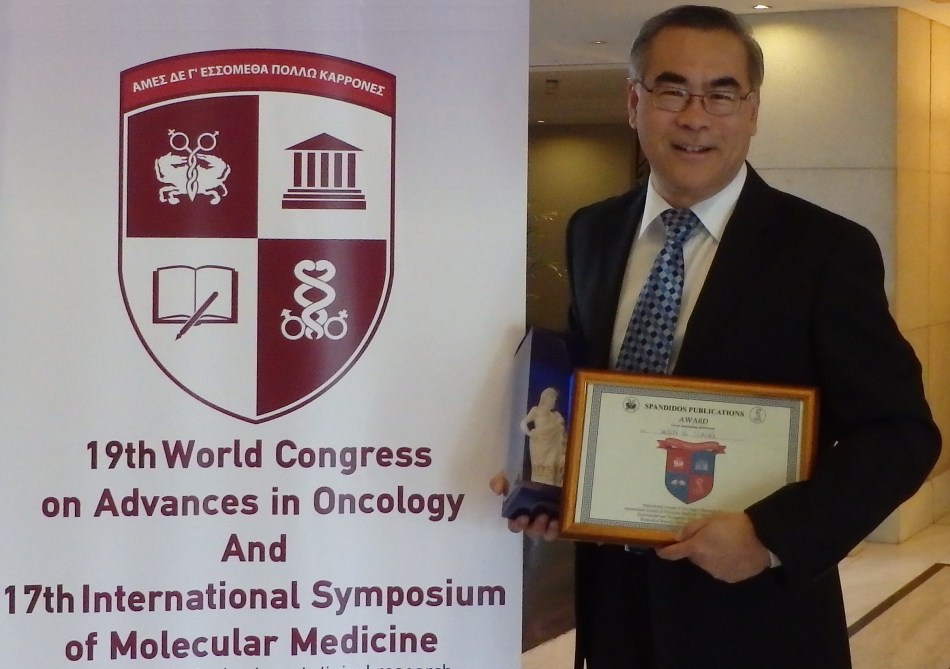
The metastasis of Quackery, and also vice versa, by Smut Clyde
A recent post by our host mentioned the impressive research productivity of Professor Wen Jiang at Cardiff University — over 500 papers! — and how this piqued the interest of the pseudonymous data-integrity vigilante, Clare Francis.
Of course high productivity is easier if one organises one’s own conferences. When the proceedings of the 2015 China-UK Cancer Conference were published in Anticancer Research, 18 of the 31 papers cited Prof. Jiang as a co-author. And one cannot afford to be fastidious in one’s choice of journals and publishers. Prof. Jiang publishes in the ambitiously-titled World Journal of Oncology, from the predatory stable of “Elmer Press”, he is also the journal’s Editor-in-Chief.
Francis’ inquiries led to a formal investigation into the re-use, re-labelling and manipulation of visual data within that research output. It has also alerted us to the presence of Fried Divine Comedy, entomophagic fungi, and general weirdness, all being stovepiped through Cardiff University, in concentrations that exceeded all expectations. The central theme is Traditional Chinese Medicine (TCM).

 Now TCM has not received good press lately, what with the impending extinction of a Pacific dolphin species as collateral damage from oceanic strip-mining for a magical fish bladder, while Himalayan habitats are stripped bare to feed the demand for the fruiting bodies of a caterpillar-parasitising fungus (the Ophiocordyceps sinensis fruiting bodies look vaguely phallic, which means by the principles of sympathetic magic that they must cure impotence). Let us hope that the related New Zealand species, O. robertsii, does not come to the attention of industrialised Chinese quackery.
Now TCM has not received good press lately, what with the impending extinction of a Pacific dolphin species as collateral damage from oceanic strip-mining for a magical fish bladder, while Himalayan habitats are stripped bare to feed the demand for the fruiting bodies of a caterpillar-parasitising fungus (the Ophiocordyceps sinensis fruiting bodies look vaguely phallic, which means by the principles of sympathetic magic that they must cure impotence). Let us hope that the related New Zealand species, O. robertsii, does not come to the attention of industrialised Chinese quackery.
Strangely enough, the current generation of Chinese leaders have adopted a policy of recognising, regulating and promoting TCM — presenting it for local consumption as an emblem of nationalist pride, and internationally as a flag-bearer for cultural supremacy. This is as weird as if India’s rulers embraced the magical mediaeval scammocopoeia of Ayurveda for political advantage, no wait. Whatever next? Will the conservative kleptocrats of Western democracies follow the same route of Renaissance revivalism, and make it patriotic to self-medicate with trichobezoar, narwhal horn, and moss scraped from a skull beneath a gibbet by midnight? But there is big money in TCM, so perhaps not so strange after all.
Here we are concerned with Yiling Pharmaceuticals, founded in 1992 by Wu Yiling (“a tutor of doctoral students”) to re-package TCM medicaments in modernised delivery vehicles, and sell them to gullible numpties around the world. His business idea was successful enough to make him the world’s 1107th-equal richest person in 2013, according to Forbes.
“Yiling pharma sticks to the principle of taking TCM academic development to impetus industrialization, taking technology as the forerunner, market as the guide, and built operational “Five in One” mode as integrating scientific research, clinical practices, production, marketing and teaching together. Yiling products involve TCM, health care products, western formulations and TCM slices etc. It owns the modern product line for capsule, soft capsule, tablet, granule, liquid injection,etc. By now, Yiling products have been exported to South Korea, Vietnam, England, Canada, Netherlands, Singapore, Russia and so on”
Even in its modern retconned recension, TCM is not concerned with the isolation of single active elements: practitioners prefer to emphasise the harmonious, symphonic blending of ingredients. So items recur… much as a mediaeval herbalist might put dried mice and skull-scraped moss in every single prescription. For instance: “Yangzheng Xiaoji” or YZXJ requires 16 components, largely vegetal in nature, though Eupolyphaga sinensis is a species of wingless cockroach — dried and pulverised — while “Endothelium corneum gigeriae galli” translates as “chicken gizzard lining”. Fortunately the definition of “herb” is sufficiently elastic as to include the fungi Poria cocos and Ganoderma lucidum.
Most of those components are re-used in “ShenLingLan extract” a.k.a. SLDM:
“Fourteen individual herbs (including Astragalus, Ligustrum lucidum, Ginseng, Ganoderma lucidum, Curcuma, Gynostemma, Atractylodes (fried), Poria, Cordyceps sinensis, Xu changqing, Eupolyphaga, Panax, diffusa, Scutellaria barbata, Divine Comedy (fried))”.
Here “fourteen” = 15 if one bothers to count… they like Ginseng so much, they include it twice. “Individual herbs” includes our fungal friend C. sinensis, while fried “Divine Comedy” is itself an ill-defined combination of multiple herbs, probably not Dante’s poem, though anything is possible.
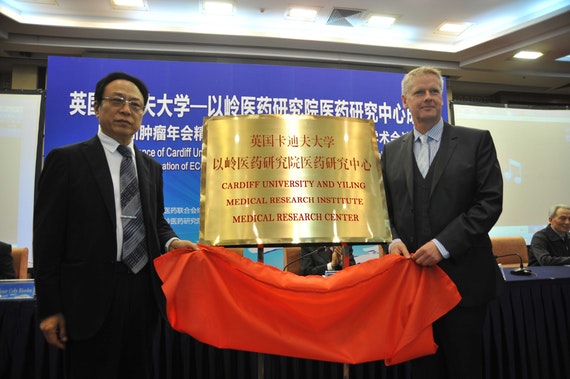
We know all this because Yiling researchers lodged a patent application in May 2012, standardising the composition of YZXJ, staking out a claim for its use in all manner of angiogenic conditions (notably cancer), and detailing how to process those 16 components. The patent includes details of a dissolved extract, DME25, with results of in-vitro studies purporting to show that the unknown blend of chemicals in that extract reduces the motility of cancer cells. Which is good news if you are ever pursued by one.
“The traditional Chinese medicine composition comprises traditional Chinese medicine ingredients such as radix astragali and ligustrum lucidum. The traditional Chinese medicine composition is capable of benefiting qi and nourishing yin, invigorating spleen and tonifying kidney, and removing stasis and relaxing vein; and the applications of the traditional Chinese medicine composition are right focused on pathomechanism. It is confirmed by experiments that the traditional Chinese medicine composition is capable of inhibiting angiogenesis effectively, and can be used for treating malignant tumor, rheumatoid arthritis, diabetic retinopathy and unstable arterial plaque in clinic”.
The translation is not perfect, but it’s free, thanks Team Google!
What brings this document to our attention is a pair of papers, submitted a few months later to the International Journal of Oncology and to Anticancer Research. The authors were a team of researchers at Cardiff University led by Prof. Wen Jiang.
An adroit use of Passive Voice allowed the Cardiff authors to foster the impression that they extracted DME25 from powdered YXZJ and named it themselves, rather than obtaining a ready-mixed form from Yiling Pharma. Ah, Passive Voice, is there anything that it can’t do can’t be done by it? Though the papers and the patent do not entirely converge on such details as the wavelength of light used to calibrate the concentration.
Test drug pretreatment
“For the convenience of the experiment, the present invention is a drug (Shijiazhuang Yiling Pharmaceutical Co., Ltd.) as follows pretreatment: Drug capsule contents present invention 400mg, added DMSOlml, rotating wheel at room temperature 20 rev / min, 12 hours, speed 14000 rpm centrifuged for 30 min, the supernatant was added balanced salt solution, filtered, the degree of absorption of 405nm metering, diluting the extract to the optical absorption of 0.25, this is called DME25, aliquots as standardized extracts, spare”.
For completeness, “Application of electric cell substrate impedance sensing in evaluation of traditional medicine on the cellular functions of gastric and colorectal cancer cells” is yet another 2012 account from Cardiff (a chapter in a book edited and co-authored by Professor Jiang). It misprints the optical density, and the calibration frequency has shifted all the way to 490 nm., blue-green light instead of violet. Copy-pasting is hard! *
Curiouser still, the papers report the same in-vitro experiments as the Patent, and are illustrated with the same Figures… despite the absence of overlap between the lists of authorship and Inventors.
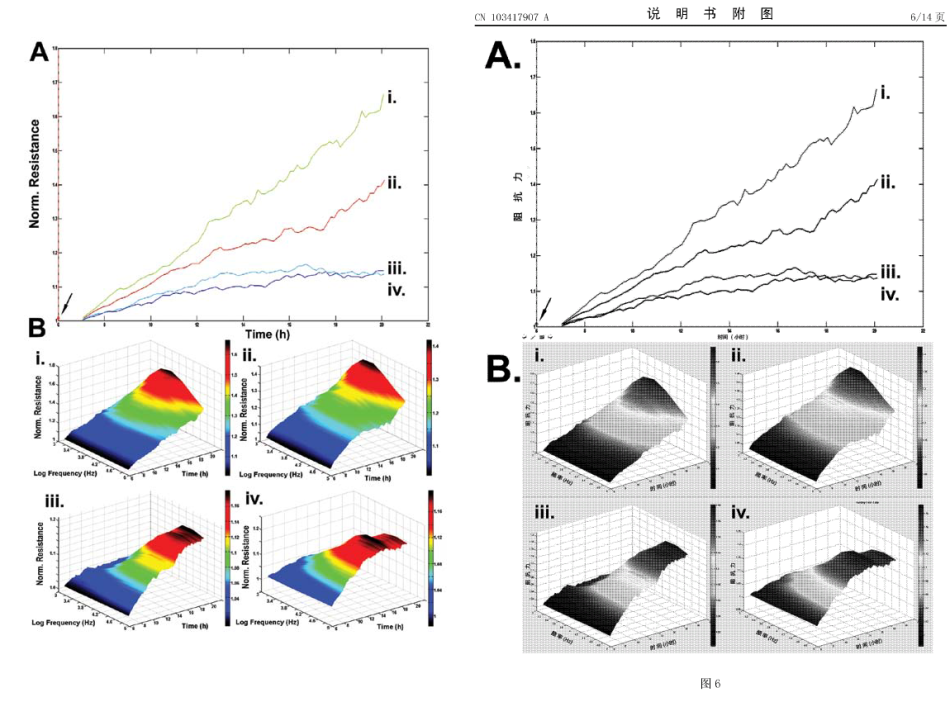
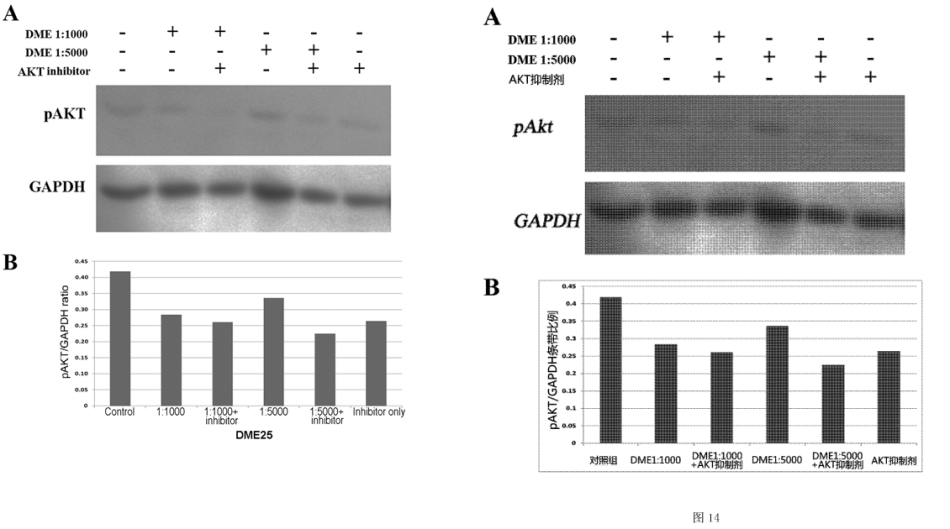
So who performed the actual research? If Yiling employees deserve the credit, we must conclude that the Cardiff staff signed their names to plagiarised results and stovepiped them into the literature. Conversely, if we credit the Cardiff staff, then their funding providers are supporting a prosperous Chinese company.
“We wish to thank the Albert Hung Foundation and Cancer Research Wales for supporting the study
The Authors would like to thank support from the Albert Hung Foundation and Cancer Research Wales”.
You will be pleased to know that the collaboration continued, with further papers on DME25, all agreeing on its inhibitory effects on cancer cells, though disagreeing on the mechanism of this inhibition (heat-shock protein 27? Focal adhesion kinase? Growth-factor antagonism? Sonic Hedgehog? All of the above?).
Authorship on these later papers now includes Yong Cao, Cong Wei and Yiling Wu. Their institutional affiliation is to Yiling Medical Research Institute, which sounds innocuous — a respectable high-minded academic institution — but in fact is just the manufacturer’s marketing wing**. So the pretence of separation between Cardiff and Yiling Pharma has been dropped, and questions like “Who did the work?” are no longer an issue. In fact Yiling Wu is the company owner, going among his people incognito in the manner of a caliph from an Arabian Nights story.***

Another point on which these papers agree is that “The authors declare that they have no competing interest”. I guess this is true, as long as “loyalty to the company whose products are examined” is the authors’ only interest.
The background to all these shenanigans is the Cardiff China Medical Research Collaborative. This is hosted at Cardiff University and appears to consist of Professor Jiang. Its functions include the promotion of the yearly China-UK Cancer Conference. The exact date of its establishment is not clear. An early press release heralding “Cardiff – Peking Universities Cancer Breakthrough” was picked up by the BBC, and is a load of self-congratulatory cobblers — packed with tropes of “ancient wisdom of the East”, more full of shit than a 10-pound pigeon.
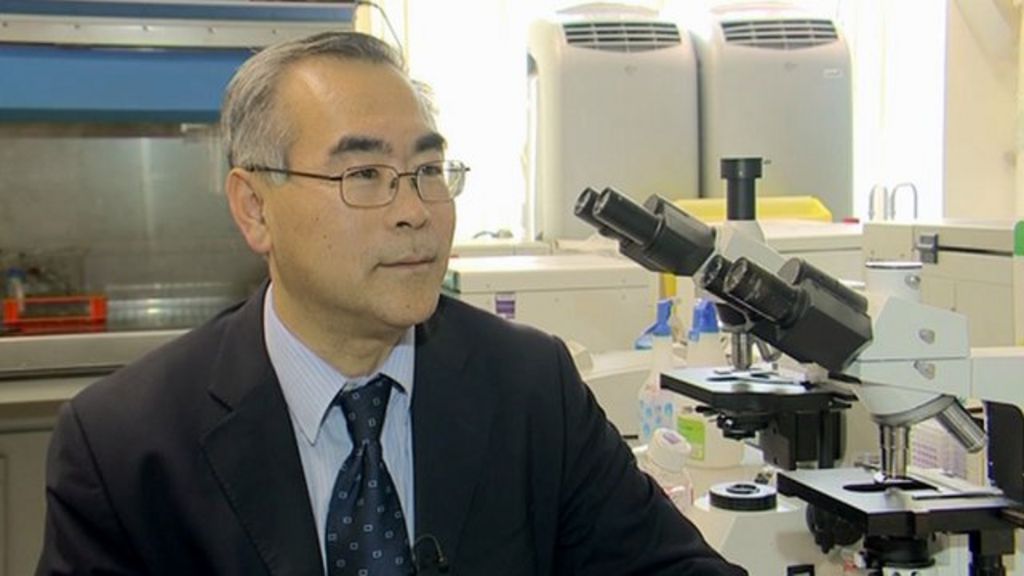
“Prof Jiang, the director of the Cardiff University- Peking University Joint Cancer Institute at Cardiff, explained: “Traditional Chinese medicine where compounds are extracted from natural products or herbs have been practised for centuries in China, Korea, Japan and other countries in Asia.
“Although a few successes, most of the traditional remedies are short of scientific explanation which has inevitably led to scepticism – especially amongst traditionalists in the West”.
This is the crucial aspect of the Collaborative:
“An award-winning medical and cancer research group working in collaboration with our partners in China – Peking University, Capital Medical University, Sun Yat-sen University and Yiling“.
So it’s a formal partnership with a TCM manufacturer, meaning that quackery and charlatanism are not just a peripheral aspect of the Collaborative, they are a central goal. The heads of Cardiff University really need to explain why they are in bed with scammers (albeit state-sanctioned ones); and why their staff and students are working on the behest of an industrial-scale quack company in China, using research grants provided by Welsh funding bodies to advertise this worthless witchdoctory.
But wait, there’s more! Prof. Jiang’s colleagues have more recently focused on giving Cardiff University’s imprimatur of legitimacy to another item from Yiling Pharma’s range of magic-based products. This being ShenLingLan, the herbal decoction mentioned above with the indeterminate number of ingredients (some of them genuinely herbal!), notably including “…panax, diffusa…”. The authors are insistent on this list, repeating it verbatim in Owen et al. (2017A), Owen et al. (2017B) and a conference poster. If you are generously minded (like me), you have wondered if the “… panax, diffusa…” was a typo for “Panax diffusa‘ — but there is no such species. There is Panax ginseng though, and there is also Damiana (Turnera diffusa), which is used as a herbal aphrodisiac.
All is clarified by an earlier Yiling Pharma patent, filed in 2002, with ShenLingLan as the subject.
“The present invention provides one medicine composition for raising body’s immunity and invigorating spleen and kidney based on the Chinese medicine theory of strengthening body’s resistance to eliminate evil. The medicine composition has 15 kinds of Chinese medicinal materials including astragalus root, privet seed, ginseng, glossy ganoderma, gynostemma pentaphylla, etc
An increase immune function pharmaceutical composition consisting ratio (weight / weight) include astragalus […] Ligustrum […] ginseng […] Ganoderma […] Curcuma […] Gynostemma […] Atractylodes (fried) […] Poria […] cordyceps […] Xu Changqing […] Eupolyphaga […] March […] diffusa […] banzhilian […] The Divine Comedy (fried)”
One can only suppose that English-speaking members of the Cardiff-Yiling collaboration were not in a position to question the quality of the translation.
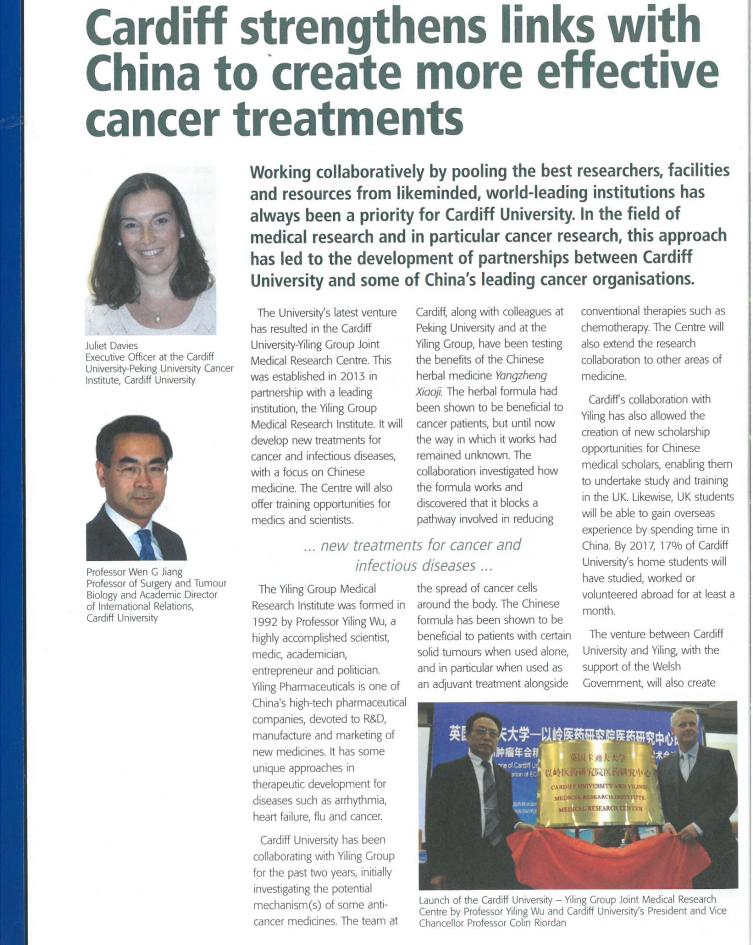
* A 2015 paper goes back to 450 nm, as the calibration wavelength, and is quite emphatic about it:
The extract was diluted in a balanced salt solution (BSS) and standardised by quantifying the optical density of the preparation using a spectrophotometer at 450 nm wavelength (Biotek, Wolf Laboratory). A master preparation which gave 0.25 OD at 450 nm was stored as the master stock and so named as DME25 for the subsequent experiments.
** As well as a product manufactory and a Research Institute, the Yiling Group has acquired its own hospital, AND a Yiling Health-themed hotel, AND a Yiling International Travel Agency to bring the suckers from all around the world.
*** A more recent DME25 patent filed by Wu Yiling and Wei Cong on behalf of Yiling Pharma claims priority for the use of the mystic decoction in preventing peritoneal metastases from cancer. Their work subsequently found its way into a presentation to the 2014 Meeting of the American Association for Cancer Research. It is not clear what the Cardiff co-authors of that presentation added to the data in the Patent, other than protective camouflage.
Update 28.03.2018. Two days ago, I received a reply to my FOIA inquiry from Cardiff University’s Assurance Adviser Alison Preece. My questions are in bold.
1. Please declare the amount of remuneration, direct or indirect, including advisory activities, which Prof Wen Jiang received from Yiling Pharma since 2012.
The University neither confirms nor denies whether records are held in relation to direct or indirect payments made to members of its staff. To confirm one way or the other whether records are held would confirm whether a payment had been made. The remuneration of individual members of staff is considered personal data and it would not be in the reasonable expectation of members of staff that such information is disclosed into the public domain. To do so would risk damage and distress to individuals and would damage the relationship of trust between employer and employee. As such to confirm or deny that information was held would likely be considered unfair to individuals and thus in breach of the first principle of the Data Protection Act concerning fairness. Therefore the exemption under S40 (5)(b)(i) is engaged.
2. Please declare the financial flows between Cardiff University and Yiling Pharma since 2012.
In the period 2014-16 the Yiling Pharmaceuticals Company Limited donated £300,000 to Cardiff University to support cancer research in the School of Medicine. The donation was used to fund a number of scholarships which allowed early career researchers and doctors, from China, to undertake cancer research within the School.
Further information on financial payments between Cardiff University and Yiling Pharmaceuticals is exempt from disclosure under Section 43(2) of the Freedom of Information Act 2000. This exemption may be applied where to release information would, or would be likely to, damage the commercial interests of the University or any third party.
Update 24.04.2018. The Cardiff University now issued a press release, where this very article was fingered for raising false allegations:
Allegations relating to research misconduct – 19/04/2018
“In recent months a number of allegations have emerged on social media and blog posts about research conducted by Professor Wen G. Jiang, notably on https://forbetterscience.com/2018/02/14/fried-divine-comedy-featuring-anti-cancer-cockroach-and-phallic-fungus/#more-23091
Some of these allegations, relating to research misconduct, were formally submitted to Cardiff University by an anonymous whistleblower.
Cases of research misconduct are rare at Cardiff University. However, when allegations are made they are considered in accordance with the University’s Procedure for Dealing with Allegations of Misconduct in Academic Research.
The University’s procedure is in line with guidance issued by the UK Research Integrity Office, to which the University subscribes.
The University has conducted a formal investigation into the allegations.
In all it reviewed allegations relating to 19 publications and has not upheld the allegations of misconduct.
Cardiff University reviews the research quality of all its academic staff as part of performance development reviews and ongoing preparations for the next national Research Excellence Framework (REF). Professor Jiang has been assessed by independent review as having research outputs of a standard eligible for submission to the next REF.
Questions have also been raised about the relationship between the Yiling Pharmaceutical Company Limited and Cardiff University
Yiling Pharmaceutical Company is one of China’s high-tech pharmaceutical companies, devoted to research and development, manufacture and marketing of new medicines. Its products are listed in China’s National Formulary and Health Insurance list.
Its research work has focused on the health benefits of the traditional Chinese medicine preparation Yangzheng Xiaoji and on the development and advancement of new treatments for cancer and infectious diseases, with a particular focus on Chinese medicine.
The Cardiff University – Yiling Group Joint Medical Research Centre was established in 2013 through a gift from Yiling Pharmaceutical Company to Cardiff University. This followed a due diligence report, completed in October 2013, which found no issues of concern.
Under the terms of the gift agreement, Yiling Pharmaceutical Company agreed to donate £300,000 over three years (November 2013 to July 2016) to support a number of scientific researchers, known as “Yiling Scholars”, through provision of a stipend, research and publication costs, to undertake research projects in cancer molecular pathology at Cardiff University.
Yiling Scholars, who were selected by Peking Cancer Hospital and Capital Medical University, were early career medical doctors and scientists. Yiling Pharmaceutical Company did not play any role in scholar selection, nor were any scholars employees of the company. The use of the gift from Yiling Pharmaceutical to Cardiff University was determined by the University, not the company.
Research conducted at Cardiff University under Professor Jiang’s direction has been concerned with understanding the molecular pathological mechanisms of cancer and metastasis. A minority of studies have examined the efficacy of traditional Chinese medicine preparations and potential mechanisms of action.

Donate!
If you are interested to support my work, you can leave here a small tip of $5. Or several of small tips, just increase the amount as you like (2x=€10; 5x=€25). Your generous patronage of my journalism will be most appreciated!
€5.00





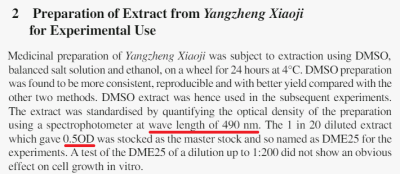

“self-medicate with trichobezoar, narwhal horn, and moss scraped from a skull beneath a gibbet by midnight?”. There’s an idea! Those things would really appeal to hipsters.
LikeLike
In retrospect, I should have said more about the Yiling Group’s website (and their FB page).

Seriously, have you ever seen anything that so closely resembles a Tijuana cancer-clinic / v14gra dispensary? With the whole Alt-Med tourism aspect? (the Group has its own hotel and its own Yiling International Travel Agency, to cash in on suckers from around the world).
However, Prof. Jiang has assured Cardiff University that Wu Yiling is a “highly accomplished scientist, medic, academician, entrepreneur and politician”, and not just an unqualified conman who used to tutor doctorate students.
LikeLike
Regarding the Divine Comedy, Chinese terms often have multiple meanings. The translation of Dante’s title is Shen Qu, which also refers to Liu Shen Qu, the medicated leaven preparation used in TCM to treat indigestion: http://www.chineseherbshealing.com/shen-qu/
It’s considered to be a herb but actually has at least six variable ingredients. Needless to say, Chinese wordplay has no place in a list of reagents in a scientific paper.
LikeLike
TCM is Bullshit of the highest Quality!! These snake oil salesmen musst be stoppen! This kind of quackery must be exposed and those ppl need to be exposed and publicly ridiculed. And they must be prosecuted to the fullest extern of the Law!
LikeLike
“Panax, diffusa”
Translating the ShenLingLen ingredients list item-by-item from the Patent, I learned that 三七 = sānqī = Panax notoginseng; 白花蛇舌草 = Hedyotis diffusa.
LikeLike
“An early press release heralding “Cardiff – Peking Universities Cancer Breakthrough” was picked up by the BBC”.
http://www.bbc.co.uk/news/uk-wales-south-east-wales-24304154
Professor Wen Jiang says “in China been shown to be effective”. He was not challenged on this statement. During the 1 minute 15 second video professor Wen Jiang is not asked a single question.
At the bottom of the video it is written “Prof Jiang said they found the Chinese medicine has a significant effect on cancer cells”.
In the text of the BBC report is written “Prof Wen Jiang from Cardiff University said they have discovered how a formula of traditional Chinese medicine works to stop cancer spreading.”
The BBC report does not seem to contain any facts, but lists statements from the professor. There is no analysis.
“Clinical trials of the combined treatment for lung and other cancers have already begun and were providing positive results, Prof Jiang added.” How would they know that until the clinical trial was completed? I cannot find results of any clinical trials in performed in Wales on the effects of Yangzheng Xiaoji (YZXJ) on cancers.
I do find this paper: https://www.spandidos-publications.com/or/30/3/1405
Antitumour effects of Yangzheng Xiaoji in human osteosarcoma: The pivotal role of focal adhesion kinase signalling.
Authors: Wen G. Jiang Lin Ye Ke Ji Fiona Ruge Yiling Wu Yong Gao Jiafu Ji Malcolm D. Mason
Affiliations: Cardiff University-Peking University School of Oncology Joint Institute, Cardiff CF14 4XN, UK, Yiling Medical Research Institute Tianshan Dajie, Shijiazhuang, Hebei, P.R. China
In this paper there are no clinical trials, but experiments on human cancer cells growing in mice.
This BBC report would not pass the test for an advertisement on commercial television.
LikeLike
“Clinical trials of the combined treatment for lung and other cancers have already begun and were providing positive results, Prof Jiang added.”
I can easily believe that clinical trials did begin on lung-cancer patients somewhere in China, but if they did, the absence of subsequent publications speaks volumes.
LikeLike
Elsewhere, in an advertisement for TCM, https://www.spandidos-publications.com/ol/10/3/1240
Prof Jiang and his fellow-spokesmen for Yiling Pharma wrote as follows:
“In a randomized double-blind lung cancer study, patients who received treatment with conventional chemotherapy combined with YZXJ (n=304) exhibited significantly increased levels of complete and partial disease remission compared with those who received chemotherapy alone (n=103) (23.3 vs. 14%, respectively; P
Except Ref 11 turns out to be “A randomly double-blinded and multicentre study of chemotherapy assisted Yangzhengxiaoji capsule on treating primary hepatic carcinoma” (that’s the paper by Wu Yiling, in the Yiling Pharma house journal).
Le and Jiang repeat the claim in a popular article for “Oncology News”, in identical words and with the same spurious reference: https://issuu.com/oncologynews/docs/010914
I also found an advertisement from Yiling — that is, something more overt about being an advertisement — which claims clinical results for lung cancer from YZXJ… except the numbers are far smaller (n = 63 and 60), and there is no publication. https://i.imgur.com/2zjVCWs.png
I do get the impression that Prof Jiang is simply regurging whatever fabrications he gets from his mate Wu Yiling.
LikeLike
A better link to the article in “Oncology News”, by Ye & Jiang, “Ancient Remedies and Modern
Anticancer Therapies: Rediscovering Traditional Chinese Medicine” — https://docs.wixstatic.com/ugd/17dcca_e10d820f628b40dcaf385bd13611a8d1.pdf
It’s a shortened version of the Spandidos review.
LikeLike
I downloaded the pdf of the journal issue linked above and make it available here
There is talk of “toad venom”, a beetle “Mylabris” and miracle cures of cancer patients. Also we learn that only female cockroaches (whole body) must be used. No information on the sex of chickens, whose gizzards are to be harvested.
LikeLiked by 1 person
“No information on the sex of chickens, whose gizzards are to be harvested.”
According to Table 1, it is not the gizzard lining that is used, it is the “wall of sand bag”.
LikeLike
Mystery solved. In 2012, Ye and Jiang wrote (summarising Wu Yiling’s claims):
“In a recent randomised doubled blinded study of patients with primary liver cancer, patients who received conventional chemotherapy combined with Yangzheng Xiaoji (n=304) showed significantly increased rate of disease remission (complete and partial remissions) compared with patients who received chemotherapy alone (n=103) (23.3% vs 14%, respectively, p<0.01) (10).”
The numbers and the wording is the same as for their later claims for lung cancer, the only difference being the replacement of “lung” for “liver”. With this level of anatomical sophistication, I hope these guys aren’t in charge of transplant surgery.
LikeLike
What changed?
LikeLike
In Oncology News Volume 9 Issue 4 • September/October 2014 page 117, Dr Lin Ye, MB, PhD, and Professor Wen G Jiang, MB, BCh, MD, FSB, FRSM., write:
“TCM [traditional Chinese Medicine] still seems to be mystical in some
ways, and is often seen as less convincing due
perhaps to the poor scientific understanding of
its pharmacodynamics, mechanisms of action,
and unconvincing clinical evidence by today’s
standards and theory of medical science.
However, in 2007 alone, $33.9 million spent by adults in the USA on CAM[1],..”
The $33.9 million spent by adults in the USA on CAM[1] [complementary and alternative medicine]
is a statement of money spent, it to does not make TCM [traditional Chinese Medicine] any more convincing.
The money spent on CAM does not make their own first sentence any less true.
People are often confused by the word “however”. It should not be used to stand logic on its head.
“However: used to introduce a statement that contrasts with or seems to contradict something that has been said previously”.
$33.9 million spent by adults in the USA on CAM does show there is money to be made and that the public in the USA is gullible.
LikeLike
The argumentum ad populam is even worse than usual here, because CAM is not confined to TCM. It is yoga, Ayurveda, exercise, massage, acupuncture, dirt supplements, hand-waving Energy-Field Manipulations, Mongolian Stick-Poking Therapy…
The statement from Drs Ye and Jiang could be paraphrased as “The fact that people spend $33.9 million on a lot of treatments, most of which we agree are worthless, makes up for the lack of evidence for TCM.”
LikeLike
Pingback: Boletim de Notícias: Temer visita Projeto Sirius nesta quinta em Campinas | Direto da Ciência
http://www.bbc.co.uk/news/uk-wales-south-east-wales-18029608
“Professor Wen Jiang helped broker the deal between Cardiff’s School of Medicine, Peking University, and Capital Medical University in Beijing.”
“To mark the joint project, Peking University has granted its highest accolade, honorary professorships, on Prof Jiang, along with Cardiff’s Prof Sir Martin Evans who won the 2007 Nobel Prize for Medicine after discovering the properties of stem cells.”
Which Nobel prize did Prof Jiang win? It does not seem proportionate. Looks like boosterism and predetermination.
LikeLike
https://www.cardiff.ac.uk/news/view/35206-vice-chancellor-honoured
“Vice-Chancellor Professor Colin Riordan has been awarded a Honorary Professorship by Peking University in China.”
“The award is the highest honour that is given by Peking University.”
“Professor Ke said: “Peking University has decided to confer its prestigious Honorary Professorship to Professor Riordan, recognising his marvellous achievements in the Humanities, education and his efforts in promoting mutual understanding and collaboration between Peking University and Cardiff University.”
“The Vice-Chancellor joins the University’s Nobel Prize winning academic, Professor Sir Martin Evans and Professor Wen Jiang from the School of Medicine in receiving the Peking University honour.”
Which Nobel prize did Vice-Chancellor Professor Colin Riordan win?
“On receiving the honour, Professor Riordan said: “It is really an enormous honour to have the Professorship conferred by a university with status such as Peking University. Last week, I accompanied the UK’s Chancellor of the Exchequer George Osborne and London Mayor Boris Johnson, who gave a lecture to Peking University and was very impressed by the calibre of the students. The collaboration between Cardiff and Peking in cancer research has been excellent to date and the Cardiff-Peking Joint Cancer Institute has a bright future.””
Vice-Chancellor Professor Colin Riordan seems an aficionado on the topic of the collaboration between Cardiff and Peking in cancer research. Could Vice-Chancellor Professor Colin Riordan specify which scientific papers to read to most fully appreciate this excellent collaboration?
LikeLike
BBC Wales has already covered this excellent collaboration.
http://www.bbc.co.uk/news/uk-wales-south-east-wales-24304154
http://www.bbc.co.uk/news/uk-wales-south-east-wales-18029608
Why doesn’t Cardiff university ask S4C,ITV Wales and West, and the city based Made in Cardiff TV to do likewise?
LikeLike
http://www.bbc.co.uk/news/uk-wales-21851085
“£4m wound research ‘will save NHS cash,’ Prof Harding says”.
Note the future tense. Is that not like a promise? We only know if a problem has been solved once it has been solved, not before.
“Wound healing has been identified as a “niche speciality” in the Welsh government’s £100m fund to boost hi-tech medical and pharmaceutical companies in Wales.”
The Welsh government is so gifting.
An alternative, cheaper low-tech solution is to pay attention when looking down the microscope.
https://www.spandidos-publications.com/ijmm/38/5/1349
Int J Mol Med. 2016 Nov;38(5):1349-1358. doi: 10.3892/ijmm.2016.2733. Epub 2016 Sep 13.
Expression of the SOCS family in human chronic wound tissues: Potential implications for SOCS in chronic wound healing.
Authors: Yi Feng Andrew J. Sanders Fiona Ruge Ceri-Ann Morris Keith G. Harding Wen G. Jiang
View Affiliations
Affiliations: Cardiff China Medical Research Collaborative, Cardiff University School of Medicine, Cardiff University, Cardiff CF14 4XN, UK, Wound Healing Research Unit, Cardiff University School of Medicine, Cardiff University, Cardiff CF14 4XN, UK
See: https://pubpeer.com/publications/3297CD21C30612467E094EC2F21E79
LikeLike
It is so funny how for some scientists is so easy to get funding and support
LikeLike
To those who have shall be given.
To those ensconced, to those at the right academic address, to those with industrial connections….
LikeLike
Cancer Cell Int. 2015 May 10;15:51. doi: 10.1186/s12935-015-0203-3. eCollection 2015.
Knockdown of WAVE3 impairs HGF induced migration and invasion of prostate cancer cells.
Moazzam M1, Ye L2, Sun PH2, Kynaston H1, Jiang WG2.
Author information
1 Metastasis & Angiogenesis Research Group, Department of Surgery, Institute of Cancer and Genetics, Cardiff, UK.
2 Metastasis & Angiogenesis Research Group, Department of Surgery, Institute of Cancer and Genetics, Cardiff, UK ; Cardiff China Medical Research Collaborative, Cardiff University School of Medicine, Cardiff, CF14 4XN UK.
Figure 6A. See: https://pubpeer.com/publications/34E1224FBF147B4AEFE2417349AAF6#2
LikeLike
There are a LOT of Jiang papers in the Pubpeer archives for possible image duplications. The Cardiff investigation barely scratched the surface!
LikeLike
Cardiff university is conflicted. If it should find against Wen Jiang it would be going against the Party line. That could be taken as a snub.
Click to access CUKC-Conference-Brochure.pdf
2010 • Cardiff’s Vice-Chancellor, Dr David Grant was named ‘International Advisor’ for CMU at the Great Hall of the People, Beijing.
2011 • “Madam MeiYing Zhang, the Vice-Chairwoman of the National Committee of the Chinese People’s Political Consultative Conference called the partnership a ‘shining example of the Sino-UK scientific collaboration’. ”
2013 • Cardiff University – Yiling Group Joint Centre for Medical Research was established.
• Peking University conferred the Honorary Professorship on Cardiff University’s President and Vice-Chancellor, Professor Colin Riordan at the International Centre of Peking University Health Science Center, hosted by Professor Yang Ke: ‘to recognise Professor Riordan’s marvellous achievement in humanity, social science, education and efforts in promoting the mutual understanding and collaboration between Peking University and Cardiff University’.
2014 • The Cardiff China Medical Research Collaborative (CCMRC) was established, based at Cardiff University.
or even going against the government line in Wales. It all sounds stage-managed.
Welcome from Wales’ First Minister, RT Hon Carwyn Jones, AM,
Dear Chair and Conference Guests,
On behalf of Welsh Government, I welcome you all to the China – UK Cancer (CUKC) Conference 2015 which is being hosted in the heart of our beautiful capital city, Cardiff. It is a great pleasure to be part of this two day event which welcomes guests from across the UK and China.
It is a delight to see the impact of partnership working across international borders where institutions are joined by a shared ambition and willingness to tackle cancer; this fits with our over-arching policy framework in Wales called ‘together for health’.
A diagnosis of cancer is a major event in the lives of increasing numbers of people; with the most commonly diagnosed cancers being breast, bowel, prostate and lung. Despite overall health improving, with our ageing population, the demand for cancer care is increasing. Over the coming years in the UK, around 1 in 3 people will be diagnosed with cancer before age 75 and around 4 in 10 at some stage during their lifetime. In Wales, cancer is one of the two biggest causes of premature death and more than 18,000 people are diagnosed with the disease every year. Cancer accounts for nearly 7% of all NHS expenditure in Wales, reaching a record high at £360.9m in 2012-13. One of the challenges we face is the financing of the NHS and therefore we need to ensure we get the maximum value and impact from our cancer services.
The Welsh Government has set out a Cancer Delivery Plan, which acts as a framework for tackling cancer in Wales to 2016. We recognise the need to shift emphasis from just treating the illness, to promoting and protecting health by creating a culture of positive lifestyle choices. It is estimated that more than 4 in 10 cancer cases could be prevented by lifestyle changes but variation in the social determinants of health leads to wide and entrenched health inequalities, both in Wales and globally. Therefore, cancer has a greater impact on the more deprived parts of the population.
The Cancer Delivery Plan is being taken forward in a collaborative approach by NHS Wales, reflecting the co-productive and prudent healthcare principles elaborated by the Minister for Health and Social Services. The plan seeks to overhaul cancer services by raising screening rates, diagnosing people at earlier stages, developing primary care oncology, making cancer pathways more efficient, giving good access to the latest radiotherapy techniques and ensuring the growing number of cancer survivors is supported. It also highlights the importance of research, which is critical to effective cancer care and attracting investment. Wales has an excellent research reputation for cancer care which results in ongoing improvements in patient outcomes, through access to novel therapies and the on-going implementation of evidence-based best practice. A strong research base stimulates opportunities for innovation, increases the competitiveness of Welsh applications for grants from UK funding bodies and industry and supports the establishment of state of the art research units and centres.
There is wide recognition that much has already been achieved in Wales. Wales has shown the biggest improvement in cancer survival in the United Kingdom since 1993. Cancer services in Wales are better organised and better placed to deliver effective care than ever before. NHS Wales treats 12% more cancer cases now than in 2004; at the end of 2009 almost 85,000 people were living after a prior diagnosis of cancer during the previous 15 years or just under 3% of the population. Moreover, services have improved, data standards are now embedded in the clinical community and new drugs and technologies have been introduced. In September 2014, Wales became the first and only country in the UK, to make the new pancreatic cancer drug Abraxane available to all eligible patients on the NHS.
There has been considerable progress in cancer care in Wales over the past 12 months. We have now established firm foundations for further positive development. This is a tribute to all those involved in the planning and delivery in this important area. Working together against cancer, we can do even better. We need to meet the expectations of people with cancer. Everyone has a role to play; the Welsh Government, the NHS, local government, cancer charities, and the public. Wales is at the forefront of the global search for a cure for cancer and we aim to match the leading global healthcare services to promote and protect the health of people in Wales by delivering high quality cancer services. There is still a tremendous amount to be done in Wales and together we must do more to fight this battle.
I am delighted that such a prestigious UK – China event is being held in Wales. Not only is it a valuable contribution to the UK – China relationship, but it is another link in the increasingly strong and active relationship that is developing between Wales and China, something to which I attach great importance. On behalf of Welsh Government, we wish CUKC 2015 every success and we look forward to the long and fruitful future of the collaboration.
RT Hon Carwyn Jones, AM First Minister of Wales Welsh Government
LikeLike
FEBS Lett. 2013 Oct 11;587(20):3289-95. doi: 10.1016/j.febslet.2013.08.026. Epub 2013 Sep 5.
Breast cancer-derived K172N, D301V mutations abolish Na+/H+ exchanger regulatory factor 1 inhibition of platelet-derived growth factor receptor signaling.
Shan Cheng a,e,1, Yang Li a,1 , Ying Yang b, Duiping Feng a,2 , Longyan Yang a , Qian Ma a, Shuai Zheng a , Ran Meng a, Shuhui Wang c , Songlin Wang a,d , Wen G. Jiang a,e,f , Junqi He a,e,
⇑
a Department of Biochemistry and Molecular Biology, Capital Medical University, Beijing 100069, China
b Proteomic Research Center, Capital Medical University, Beijing 100069, China
c Department of Neurology, Beijing Friendship Hospital, Capital Medical University, Beijing 100069, China
d Molecular Laboratory for Gene Therapy and Tooth Regeneration, Capital Medical University School of Stomatology, Beijing 100050, China
e Capital Medical University-Cardiff University Joint Centre for Biomedical Research, Capital Medical University, Beijing 100069, China
f Metastasis and Angiogenesis Research Group, Department of Surgery, Cardiff University School of Medicine, Heath Park, Cardiff CF14 4XN, UK.
Figure 1. See: https://imgur.com/wTz04HT
LikeLike
Blue collar cancer fraud. http://news.bbc.co.uk/1/hi/wales/south_east/4515168.stm
LikeLike